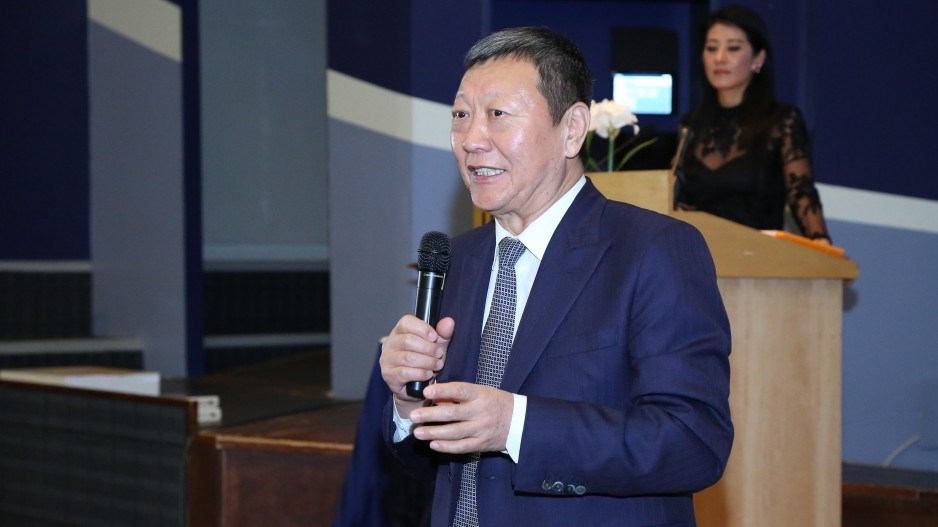Two founders of China’s dairy giant Mengniu Dairy Co. Ltd. are launching a Vancouver-based company aimed at accelerating Canadian adoption of Mandarin Chinese to make it easier for Canada to do business with China.
Mengniu founder Niu Gensheng, who lives in China, and co-founder Sun Xianhong, a Vancouver resident, launched New Occidental Education & Technology Ltd. at a May 11 event at the University of British Columbia’s downtown campus. The group is introducing a new system of Mandarin learning that officials said will speed up the process. It’s drastically different from the official Pinyin method, which uses the Latin alphabet to spell out Chinese words.
The goal is to “open China’s 1.37 billion population to Canadian businesses” by knocking down the language barrier, said Niu, who retired from Mengniu in 2006 and now focuses on philanthropy through his foundation.
“With the Chinese market growing the way it is, how do you participate if you can’t understand what’s being said?” he noted. “My thinking is that China’s population is the largest in the world, so the number of speakers for the Chinese language should also be the largest in the world. But what I’ve seen in the West shows that Mandarin is not even among the top three.”
Canadian enrolment figures are scarce, but numbers from the American Council on the Teaching of Foreign Languages show that in 2008 – the most recent statistics available – only 59,860 K-12 students enrolled in Mandarin classes, well short of the top three of Spanish (6,418,331), French (1,254,243) and German (395,019). Japanese, another Asiatic language perceived as being difficult to learn, had 72,845 students.
A 2013 Modern Language Association report showed a similar breakdown in American universities and colleges, which many observers attribute to Mandarin’s perceived difficulty to master. The U.S. Foreign Service Institute ranks the official Chinese language as among the four hardest languages for English speakers, requiring 2,200 hours (or 88 weeks) to reach professional proficiency. French and Spanish, in comparison, require approximately 575 hours, or 23 weeks.
But that perceived difficulty is false, said Sun – one of China’s premier brand-management executives. He said New Occidental’s system, invented 20 years ago by two Chinese scholars focusing on grouping together characters with shared structures or similar shapes , has been catching on in China and can reduce the required learning time to 200 hours.
“Forget about anglophones thinking that learning Mandarin is hard,” Sun said. “Even Chinese people think it’s hard. And after so many people repeat that statement again and again, people start to believe it’s true. But by grouping similar shapes together, if you can doodle, you can learn Chinese. And who can’t doodle?”
Officials did not disclose the amount invested by the pair in New Occidental, which now has a staff of approximately 20 in Vancouver and Toronto. The group is producing several sets of educational material and promoting it heavily in the local private school and higher education scene. At least one school – West Vancouver’s Mulgrave School – is already showing significant interest.
Mengniu, founded in 1995, today generates around US$2 billion in annual revenue and is publicly traded on the Hong Kong Stock Exchange. In 2008, it was among the companies caught up in the melamine milk powder scandal, but it remains one of the most successful entrepreneurial enterprises in recent Chinese history.
Niu has had contact with Microsoft (Nasdaq:MSFT) founder Bill Gates in philanthropy work, and the Chinese magnate said he has talked to Gates about promoting Chinese-language education in the West. Niu’s own support for the program originates from its aforementioned popularity among new students in China, as well as his own difficulties communicating with others in his charitable endeavours.
“If people worry about foreign cultural values seeping into English-speaking society, what I can say is that there are far more people in China learning and speaking English than there are English-speakers learning Chinese,” he said. “So there has been far more cultural influence from the anglophone side.”
Sun acknowledged that there are some negative sentiments against Chinese language in Lower Mainland mainstream society recently, but he remains confident that – once people gain the ability to learn Mandarin more easily – that antagonism will subside.
“You fear if you don’t understand. When I first moved here, I was terrified to even drive around because I understood almost no English. If, in five years, the Canadian mainstream public can understand that Mandarin is easy to learn, then we’ve served our purpose.”




